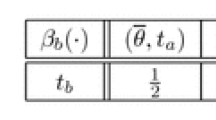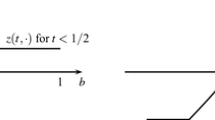Abstract
In a game with incomplete information, a player may have beliefs about nature, about the other players' beliefs about nature, and so on, in an infinite hierarchy. We generalize a construction of Mertens & Zamir and show, that if nature is any Hausdorff space, and beliefs are regular Borel probability measures, then the space of all such infinite hierarchies of the players is a product of nature and the types of every player, where a type of a player is a belief about nature and the other players' types.
Similar content being viewed by others
References
Andersen ES & Jessen B, On the Introduction of Measures in Infinite Product Sets, Danske Vid. Selsk. Mat-Fys. Medd 25 (1948), 8 pp.
Armbruster W & Boge W, Bayesian Game Theory, in O Moeschlin & D Pallaschke (eds.), Game Theory and Related Topics, Amsterdam: North Holland (1979).
Billingsley P, Convergence of Probability Measures, John Wiley & Sons (1968).
Blau JH, The space of Measures on a Given Set, Fund. Math. 38 (1951), pp. 23–34.
Bochner S, Harmonic Analysis and the Theory of Probability, University of California Press (1960).
Boge W & Eisele T, On Solutions of Bayesian Games, Int. Jour. Game Theory 8 (1979), pp. 193–215.
Brandenburger A & Dekel E, Hierarchies of Beliefs and Common Knowledge, Working Paper, Harvard Business School (1990).
Halmos P, Measure Theory, Springer-Verlag (1950).
Harsanyi JC, Games with Incomplete Information Played by Bayesian Players, parts I, II, & III, Man. Sc. 14 (1967–68), pp. 159–182, 320–334, 486–502.
Heifetz A, Hierarchic Constructions of Incomplete Information Models, preprint, School of Mathematical Sciences, Tel Aviv University (1990).
Lipman BL, How to Decide How to Decide How to ...: Modeling limited Rationality, Carnegie Mellon University (1988).
Mertens JF & Zamir S, Formulation of Bayesian Analysis for Games with Incomplete Information, Int. Jour. Game Theory 14 (1985), pp. 1–29.
Mertens JF, Sorin S & Zamir S, Repeated Games, preprint.
Métivier M, Limites Projectives de Mesures, Martingales, Applications, Ann. Mat. Pura Appl. (sn4) 63 (1963), pp. 225–352.
Myerson RB, Bayesian Equilibrium and Incentive-Compatibility: an Introduction, in L Hurwicz, D Shmeidler & H Sonnenschein (eds.), Social Goals and Social Organization, Essays in Memory of Elisha A. Pazner, Cambridge University Press (1985).
Vassilakis S, Economic Data Types, Working Paper no. 252, Econ. Dept., University of Pittsburgh (1989).
Willard S, General Topology, Addison Wesley (1970).
Author information
Authors and Affiliations
Additional information
This work constitutes the main part of my M.Sc. dissertation, and I am grateful to my supervisor, Prof. Dov Samet, for his excellent guidance. I am also indebted to Prof. Shmuel Zamir and Prof. Adam Brandenburger for fruitful discussions.
Rights and permissions
About this article
Cite this article
Heifetz, A. The bayesian formulation of incomplete information — The non-compact case. Int J Game Theory 21, 329–338 (1993). https://doi.org/10.1007/BF01240148
Received:
Revised:
Issue Date:
DOI: https://doi.org/10.1007/BF01240148




